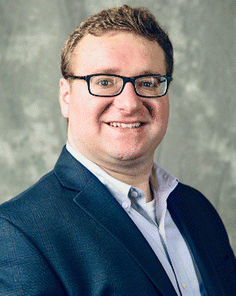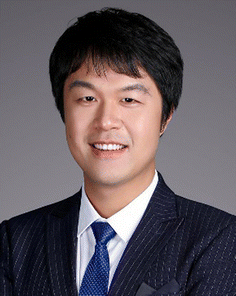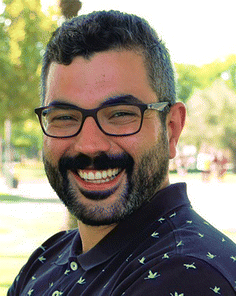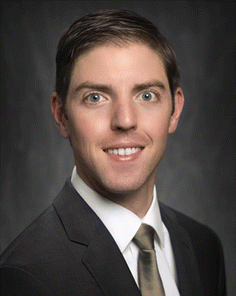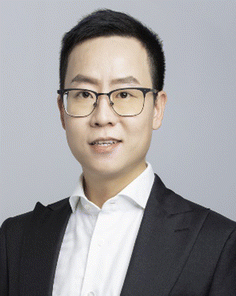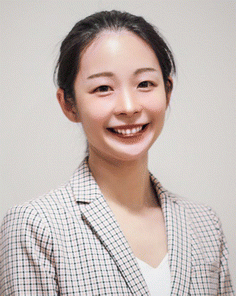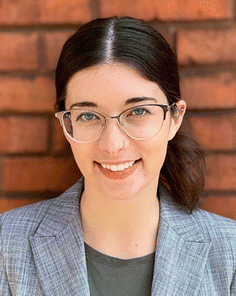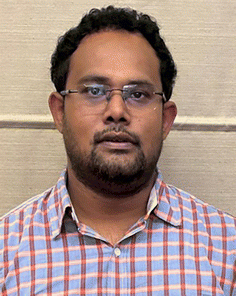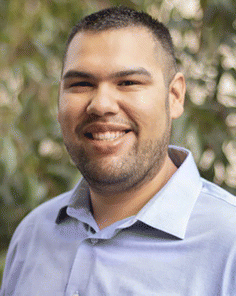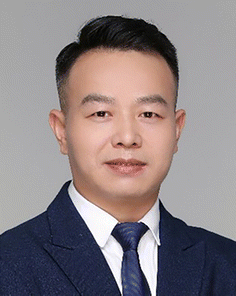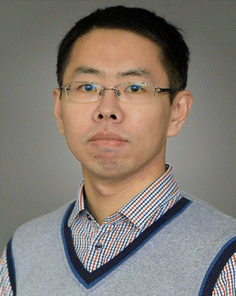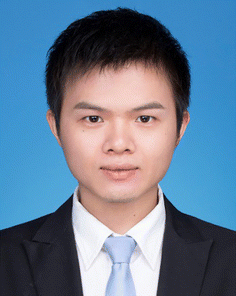Contributors to the Emerging Investigators collection 2024: Part 2
Keriann Backus is an associate professor of biological chemistry and chemistry and biochemistry at the University of California, Los Angeles. Her graduate studies were conducted in the laboratories of Benjamin Davis at the University of Oxford and Clifton Barry at the NIH as a 2007 Rhodes Scholar and an NIH Oxford Cambridge Scholar. Prior to joining the faculty at UCLA, she completed postdoctoral studies at the Scripps Research Institute in the laboratory of Benjamin Cravatt. Keriann’s current research focuses on developing and applying chemoproteomic technologies for a range of applications, including covalent probe discovery, redox biology, and proteoform-specific biology.
Michael W. Beck earned his BS in chemistry (Biochemistry Concentration) at Tennessee Technological University in 2011 where he started his research career by performing undergraduate research with Edward Lisic. He then obtained his PhD in chemistry (2015) at the University of Michigan with Mi Hee Lim. After completing his postdoctoral studies with Bryan Dickinson at the University of Chicago, he joined the Department of Chemistry and Biochemistry at Eastern Illinois University as an assistant professor in 2019. His research group focuses on designing chemical tools to study spatially organized biochemistry in live cells while training the next generation of scientists.
Xiaosong Cao is an associate professor in the College of Materials Science and Engineering at Shenzhen University. He earned his MS from Wuhan University in 2013 under the supervision of Prof. Chuluo Yang and completed his PhD research with Prof. Haifeng Gao at the University of Notre Dame in 2019. His research focuses on the design, synthesis, and device applications of organic semiconducting materials, particularly in regulating the excited states of narrowband organic emitters for high-definition displays. He has published over 100 papers in peer-reviewed journals and has an h-index of 34.
Alfonso J. Carrillo holds a PhD in chemical engineering from Universidad Rey Juan Carlos (Spain) – research conducted at IMDEA Energy. Then, he moved to the Electrochemical Materials Laboratory, first at ETH Zurich (Switzerland), and later at MIT (USA), where he was a 2018 Eni-MIT Energy Fellow. He has been awarded the Energy and Environmental Research Grant by Fundación Iberdrola, Juan de la Cierva Formación by the Spanish Ministry of Science, and Junior Leader Fellowship by Fundación LaCaixa. He has worked at ITQ (Spain) since January 2019, with a focus on the functionalization of redox oxides for energy storage and production of renewable fuels.
Matthew Chambers is an assistant professor in the Department of Chemistry at Louisiana State University. His research focuses on molecular catalyst development and understanding the structural and mechanistic insights that underpin their potential utilization in sustainable processes relevant to the chemical industry. Before LSU, he was a postdoctoral researcher at UNC Chapel Hill with Alex Miller (2015–2017) and at the Collège de France with Marc Fontecave (2013–2015). He obtained his PhD under the supervision of Dan Nocera at MIT (2013). He earned his undergraduate degree from Cornell University while working in the group of Pete Wolczanski (2007).
Dr Tanmay Chatterjee is currently an associate professor of chemistry at Birla Institute of Technology and Science, Pilani (BITS Pilani), Hyderabad campus, working in the area of green organic synthesis by iodine catalysis, electrocatalysis, visible-light photocatalysis, and metal-free sustainable organic transformations. He received a master’s degree in chemistry from IIT Delhi in 2009 and a PhD in 2014 from the Indian Association for the Cultivation of Science, Kolkata. He worked as a postdoctoral fellow at Hanyang University and a research professor at Chung-Ang University, both in South Korea, from 2014 to 2017, before joining BITS Pilani as an assistant professor.
Josep Cornella (Pep) carried out BSc and MSc studies at the University of Barcelona. In 2008, he moved to the United Kingdom to pursue doctoral studies in the group of Prof. Igor Larrosa (QMUL). In 2012, he joined the group of Prof. Ruben Martin (ICIQ) as a Marie Curie Postdoctoral Fellow. In 2015, Pep joined the group of Prof. Phil S. Baran at the Scripps Research Institute, California, USA. In spring 2017, he was appointed as a Max Planck Research Group Leader at the Max-Planck-Institut für Kohlenforschung in Germany, where he leads the Sustainable Catalysis Laboratory.
Noémie Elgrishi is an associate professor at Louisiana State University. A native of France, she received her higher education from ENS Paris and Sorbonne Université. During her master’s degree, she studied host–guest chemistry with Johnathan Nitschke at the University of Cambridge and energy storage with Daniel Nocera at MIT. In 2015, she completed her PhD under the guidance of Marc Fontecave at Collège de France. She then moved to UNC–Chapel Hill to pursue postdoctoral studies under the mentorship of Jillian Dempsey. Noémie’s current research is at the intersection of electrochemistry and supramolecular chemistry to solve water and energy challenges.
Xinyuan Fan is a research associate professor at Peking University, China. He received his PhD in Organic Chemistry in 2014 from the Institute of Chemical Research of Catalonia, Spain, under Prof. Miquel Pericàs. He then pursued postdoctoral studies in bioorthogonal chemistry at Peking University. After two years as an associate professor at Nanjing Tech University, focusing on photocatalytic reactions, he returned to Peking University in 2019, where he applies photocatalytic chemistries to address biological questions. His research merges chemistry and biology, developing advanced chemical tools, including bioorthogonal photocatalysis for spatiotemporal control and omics analysis in biological systems.
Weijiang Guan received his BSc degree from Tianjin University, his PhD degree from Beijing University of Chemical Technology (with Prof. Chao Lu), and his postdoctoral research experience at the Hong Kong University of Science and Technology (with Prof. Ben Zhong Tang). He is currently an associate professor at the State Key Laboratory of Chemical Resource Engineering, Beijing University of Chemical Technology. His research interests focus on the design and synthesis of multifunctional luminescent materials for optical spectroscopy and imaging.
Karl J. Jobst is an associate professor in the Department of Chemistry at Memorial University of Newfoundland. He is also an adjunct assistant professor in the Department of Physical and Environmental Sciences at the University of Toronto Scarborough. His current research focuses on the identification of emerging contaminants and understanding their environmental and human health impacts using novel mass spectrometry and computational methods. Dr Jobst has (co)authored over 100 publications in peer-reviewed journals and serves on the editorial board of Current Opinion in Environmental Science & Health. In 2021, Dr Jobst received the Terra Nova Innovator Award.
Dr Fardin Khabaz is an assistant professor at the School of Polymer Science and Polymer Engineering and the Department of Chemical Engineering at The University of Akron. He earned his PhD in chemical engineering from Texas Tech University and completed his postdoctoral research at the McKetta Department of Chemical Engineering at the University of Texas at Austin. His research explores rheology of soft matter, including high-density suspensions and associative polymer networks, with a focus on linking macroscopic properties to microscopic structure and dynamics through theory and simulations. Dr Khabaz’s contributions have been recognized with awards such as the Joliot-Curie Faculty Award and the Paris-Sciences Chair Award from ESPCI Paris.
Christine Le is an assistant professor at York University in Toronto (Canada). She received her BSc from Western University (2011), and her MSc (2012) and PhD degrees (2016) from the University of Toronto in the labs of Professor Vy Dong and Professor Mark Lautens, respectively. In 2017, Christine moved to UC Berkeley as an NSERC Postdoctoral Fellow, working under the guidance of Professor F. Dean Toste. Her current research program focuses on the synthesis of fluorinated building blocks and their application in fluoride-enabled transformations. For more information about the Le Group: https://www.leresearchgroup.com.
Guofeng Liu is currently a Professor of Special Appointment (Eastern Scholar) at the School of Chemical Science and Engineering, Tongji University. He completed his BS at Huazhong Agricultural University, his MS at East China University of Science and Technology, and his PhD at Shanghai Jiao Tong University. After his PhD, he conducted postdoctoral research at Nanyang Technological University, focusing on supramolecular hydrogels and chiral self-assembly. His research interests include dynamic chemical self-assembly systems, chiral soft matter, and circularly polarized luminescent materials.
Liu Leo Liu is an associate professor at the Southern University of Science and Technology, where he leads a dedicated research team focusing on the development of ambiphilic main-group compounds. His contributions have earned him multiple awards, including the Chinese Chemical Society (CCS) Young Chemist Award, the CCS Jingqing Rising Star Award, the Huang Yao-Zeng Organometallic Chemistry Award for Young Chemists and the Distinguished Lectureship Award from the Chemical Society of Japan. He serves on the Early Career Advisory Board for journals such as EurJIC, Chinese Chemical Letters, and Inorganic Chemistry Frontiers.
Yayuan Liu is currently an assistant professor in the Department of Chemical and Biomolecular Engineering at the Johns Hopkins University. She earned her BS in materials science and engineering from Nanyang Technological University in 2014. She then obtained her PhD from Stanford University under the tutelage of Professor Yi Cui in 2019, working on developing new materials for lithium metal batteries. From 2019 to 2021, she worked with Professor T. Alan Hatton at the Massachusetts Institute of Technology as a postdoctoral researcher. Her current research focuses on electrochemically mediated processes for chemical separations and energy storage.
Kate Marczenko is currently an assistant professor in the Department of Chemistry at Carleton University, Ottawa, ON. She completed her MSc at McMaster University (2018) and PhD at Dalhousie University (2021). Kate was the recipient of numerous awards, including a Vanier scholarship, Michael Smith Supplement, and Killam Scholarship during this time. She joined the University of Guelph as a Crystallographer and Instructor in 2021 and then started her independent career at Carleton University ∼2 years later, on June 1, 2023. Kate’s research interests focus on the structure, behaviour, and applications of crystalline materials.
Biswajit Mondal joined Indian Institute of Technology Gandhinagar (India), Department of Chemistry in 2021, and the focus of his research group is on the electrochemical value addition to waste plastic and biomass. He received his MSc from Indian Institute of Technology Kharagpur (India) in 2009, and his PhD from Indian Association for the Cultivation of Science (India) under the tutelage of Prof. Abhishek Dey in 2011. He then moved to the University of Wisconsin, Madison (USA), for a postdoc with Prof. Shannon S. Stahl (2017–2020), followed by another postdoc at Ben-Gurion University of the Negev, Israel, with Prof. Menny Shalom (2020–2021). See web page: https://biswajitiitgnchem.org.in.
Zheng Niu is currently a professor in the College of Chemistry, Chemical Engineering and Materials Science at Soochow University. Dr Niu obtained his PhD from Nankai University in 2014. From 2015 to 2019, he conducted postdoctoral research in the Department of Chemistry, University of South Florida. In 2019, he joined the College of Chemistry, Chemical Engineering and Materials Science of Soochow University as a distinguished professor and PhD supervisor. His research focuses on the assembly of MOF materials, MOF-based frustrated Lewis-pair catalysts, the adsorption and separation of gases by MOF materials, and membrane separation.
Erik Romero started as an assistant professor at UC San Diego (USA) in 2021. Erik attended UC Riverside for his undergraduate education, working with Prof. Thomas Morton, and received his PhD from UC San Diego with Guy Bertrand. For his postdoctoral work, Erik moved to UC Berkeley to work with John Hartwig. His current research focuses on discovering new catalytic reactions and elucidating their operative mechanisms using physical-organic experiments and organometallic synthesis.
Michael T. Ruggiero is an associate professor of chemistry and chemical engineering at the University of Rochester. He earned degrees in chemistry from SUNY Geneseo and Syracuse University, followed by a postdoctoral fellowship at the University of Cambridge. He began his independent career at the University of Vermont before moving to Rochester in 2023. He is an NSF CAREER award recipient, a former editor for Crystal Growth & Design, and a cheerleader for the use of terahertz spectroscopy in materials chemistry research. Outside of the lab, he enjoys spending time with his family—trudging up, and zipping down, big mountains.
Lixue Shi is currently an associate professor of the Institutes of Biomedical Sciences (IBS) at Fudan University, China. She carried out her graduate studies in physical chemistry at Columbia University under the supervision of Professor Wei Min, focusing on pushing the sensitivity of Raman spectroscopy. After completing her PhD in 2019, she continued as a postdoctoral fellow in Min’s lab to devise high-content bioimaging tools. Since starting her independent career in 2023, Lixue has focused on developing new vibrational imaging tools to conquer the next exciting frontier in spatial biology: spatial proteomics and metabolomics.
Arnaud Thevenon is an assistant professor at Utrecht University. He obtained his MSc degree from EPFL and completed his PhD (2018) at the University of Oxford under the supervision of Charlotte K. Williams. He was a Marie Skłodowska-Curie postdoctoral researcher at Caltech (2018–2020) in the group of Theodor Agapie and then at the University of Konstanz (2020–2021) in the group of Stefan Mecking before joining Utrecht University in 2021. His research interests include the development of homogeneous thermo/electrocatalysts for small molecules, biomass, and waste (plastic) valorization, as well as the development of novel polymers that are intrinsically circular by design.
Dr Renheng Wang received his PhD degree in metallurgical engineering from Central South University (CSU) in 2015. From January 2016 to October 2018, he worked as a postdoctoral follow at Nanyang Technological University. He is currently a researcher in the College of Physics and Optoelectronic Engineering at Shenzhen University. His research focuses on the synthesis and application of nanomaterials and composites for energy conversion and storage, such as high-power/high-energy secondary batteries. He has published more than 80 papers in journals including Angewandte Chemie International Edition, Advanced Materials, Matter, ACS Nano, Advanced Functional Materials and Advanced Energy Materials.
Peifa Wei obtained his PhD from Zhejiang University under the guidance of Prof. Feihe Huang in 2011. From December 2014 to June 2015, he was an exchange PhD student in Prof. Peter J. Stang’s group at the University of Utah. He joined Prof. Ben Zhong Tang’s group in the Hong Kong University of Science and Technology as a postdoc in July 2016. In September 2019, he became a professor at Anhui University, China. His current research interests are controllable supramolecular photofunctional materials. He has published more than 70 SCI papers with more than 3500 citations. He sits on the Youth Editorial Board of Chinese Chemical Letters.
Professor Chengliang Xiao graduated from Zhejiang University with a PhD degree in 2011 and successively worked at Purolite (China) Co. Ltd, Institute of High Energy Physics (CAS), Soochow University, and Northwestern University (USA). Now, he is a professor in the College of Chemical and Biological Engineering at Zhejiang University. His research interests mainly focus on the chemical separation relevant to the nuclear fuel cycle, medical isotope production and critical metal recovery.
Tangxin Xiao received his PhD in supramolecular chemistry from Nanjing University in 2014, supervised by Prof. Leyong Wang. Following postdoctoral research on fine chemicals at the Zhejiang University-NHU Company United R&D Center, he joined Changzhou University in 2017. He was promoted to associate professor in 2020 and to professor in 2023. From 2021 to 2022, he was funded by the China Scholarship Council (CSC) as a visiting scholar in Prof. Oren Scherman’s group at the University of Cambridge. His current research interests focus on supramolecular chemistry and luminescent materials. He has co-authored more than 80 publications with over 4000 citations.
Jiangping Xu received his Bachelor’s degree from University of Science and Technology of China and completed his PhD degree in Changchun Institute of Applied Chemistry, Chinese Academy of Sciences. Then, he did his postdoctoral research at Huazhong University of Science and Technology (HUST) and University of Toronto. In 2018, he was appointed as a professor of chemistry at HUST. His research interests focus on the self-assembly of block copolymers and nanoparticles.
Guoping Yang received his PhD degree from the Beijing Institute of Technology in 2019. He is currently an assistant professor in the Jiangxi Key Laboratory for Mass Spectrometry and Instrumentation, State Key Laboratory of Nuclear Resources and Environment, East China University of Technology. He established and led the “Actinide Crystalline Materials” research group. His research focuses on the design and assembly of novel lanthanide/actinide crystalline materials (MOFs/POMs), green catalytic organic synthesis, and photocatalytic chemistry.
Ruquan Ye is an associate professor at the City University of Hong Kong. He received his PhD in chemistry from Rice University in 2017 under Professor James Tour’s supervision. During his training, he focused on developing novel methods for synthesizing nanomaterials. He then worked as a postdoctoral associate with Professor Karthish Manthiram at the Massachusetts Institute of Technology, where he started working on carbon dioxide reduction reactions. His research group currently focuses on laser-enabled materials synthesis, catalysis and molecular electrochemistry.
Shuai Yuan received his BS in chemistry from Shandong University in 2013. He joined Texas A&M University and received his PhD in chemistry in 2018 under the supervision of Prof. Hong-Cai Zhou. His thesis work focused on the synthesis of stable and multifunctional MOFs. He then moved to MIT for postdoctoral research, where he explored the application of MOFs for electrocatalysis. In 2021, he joined Nanjing University as a professor of chemistry. His research is focused on designing synergistic catalysts using multi-component MOFs and exploring their applications in energy-related fields.
Heng Zhang received his PhD degree in chemistry from Huazhong University of Science and Technology (HUST, China). Then, he joined CIC EnergiGUNE as a postdoc researcher (2016–2017) working with Prof. Michel Armand, and later he acted as the Research Line Manager of Polymer Electrolytes at CIC EnergiGUNE (January 2018–June 2020). Since August 2020, he has been a full professor of organic chemistry at HUST. His research interests focus on non-aqueous electrolyte materials, particularly salt anions and solid polymer electrolytes, for rechargeable batteries.
Longsheng Zhang received his PhD degree in 2020 from Fudan University. He is currently an associate professor in the School of Chemical and Material Engineering at Jiangnan University. His research interests focus on the synthesis of conjugated coordination polymers and their applications in renewable energy conversion.
| This journal is © The Royal Society of Chemistry 2024 |


